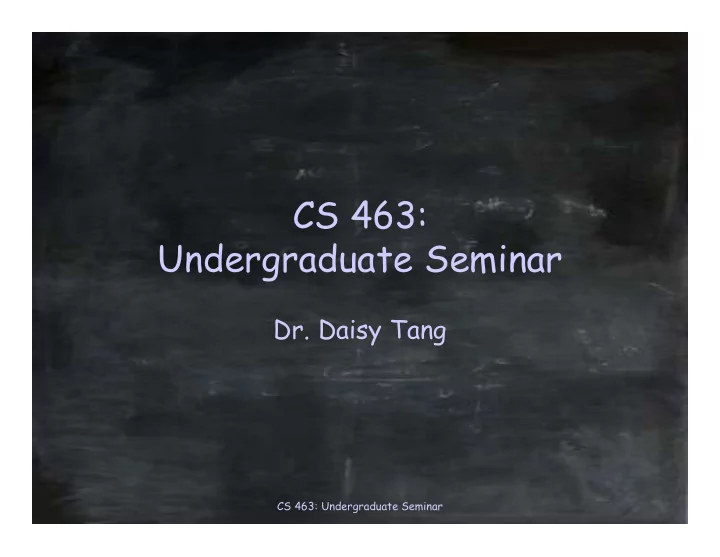

CS 463: Undergraduate Seminar Dr. Daisy Tang CS 463: Undergraduate Seminar
Outline Introduction to CS 463 Presentation Guidelines Other Rules References CS 463: Undergraduate Seminar
Introduction to CS463 Course Website 463 – http://www.cpp.edu/~ftang/teaching.html CS 463: Undergraduate Seminar
Presentation Guidelines Give some guidelines to speakers as well as audience – General do’s and don’ts in making a presentation or listening to a presentation – For speakers – For audience – Question/discussion session – Evaluation CS 463: Undergraduate Seminar
Guidelines for speaker Guidelines for audience Question/discussion Evaluation CS 463: Undergraduate Seminar
Guidelines for the Speaker Know your audience Know your equipment and environment Use proper font/style/color Include proper content Do not clutter your slide A picture is worth a thousand words Minimize special effects Do not read your slides Keep your presentation going Provide a break when transition Talk to the audience Rehearse yourself CS 463: Undergraduate Seminar
Length of Presentation Different occasions, different lengths For 2 presenters per day: – 30 to 35 minutes talk – 5 to 10 minutes questions/discussion – Total = 40 minutes For 3 presenters per day: – 25 minutes talk – 5 minutes questions/discussion – Total = 30 minutes Penalty for < 30 or > 45 The ideal time for each slide is 1 to 2 minutes CS 463: Undergraduate Seminar
Presentation Content Four golden questions: – Where are we now? – Where are we going? – How did we get there? – What is left for the future? A good talk will provide brief answers to the first three questions and then focus on: – Where are we now? – How did we get there? CS 463: Undergraduate Seminar
List of Contents for Your Talk Brief introduction – Current state of the art – Why you are interested in this topic – High-level description of the main results Background and problem definitions Technical depth – Describe the methods/techniques for solving the problem – Describe the experiments and analyze results Conclusion and future work References CS 463: Undergraduate Seminar
Some Hints for Your Talk When changing topics, summarize what you have discussed so far and relate to what you are about to discuss next Introduce concrete examples before formal algorithms Do a demo before discussing a software system in depth A picture is worth a thousand words CS 463: Undergraduate Seminar
Guidelines for speaker Guidelines for audience Question/discussion Evaluation CS 463: Undergraduate Seminar
Guidelines for Audience Active listening – Write down comments during talk – May directly write on the evaluation form Asking questions – You may interrupt the talk for clarification or correct mistakes – Other questions that require longer time should wait till the end – Always raise your hand before asking questions CS 463: Undergraduate Seminar
Guidelines for speaker Guidelines for audience Question/discussion Evaluation CS 463: Undergraduate Seminar
Guidelines for Question and Discussion Session (1) Everyone is required to participate – Formulate your questions or comments – Raise your hand and wait for your turn – Please don’t be shy – No question is a silly question If you don’t quite understand the talk, ask the speaker to give a brief summary If you are not quite sure about some details, ask the speaker to explain more on particular slides CS 463: Undergraduate Seminar
Guidelines for Question and Discussion Session (2) For any question: – Let the speaker answer the question first – Audience may add more or bring up more discussions Speaker may ask audience questions too – To warm up the discussion session – To know whether the audience really understand the talk CS 463: Undergraduate Seminar
Guidelines for speaker Guidelines for audience Question/discussion Evaluation CS 463: Undergraduate Seminar
Guidelines for Evaluation Give a score in each required section – Be objective – Give high score to friends without justification may lower your own score Comments – Be specific and constructive – Don’t write same comments again and again – Will be sent back to the speaker anonymously Your evaluation will be part of your final score CS 463: Undergraduate Seminar
Evaluation Form http://www.cpp.edu/~ftang/courses/CS463/463% 20evaluation%20form.pdf CS 463: Undergraduate Seminar
Other Rules Attendance is mandatory – Please come on time and attend every session – Refer to syllabus for details No make-up presentation is allowed except for emergency – If needed, the class will meet on the final week CS 463: Undergraduate Seminar
References Every talk must include a reference list Li, Victor, “ Hints on Writing Technical Papers and Making Presentations”, IEEE Transactions on Education, vol. 42, no. 2, May 1999. Dr. Brad Vander Zanden’s ” Preparing an Effective Presentation” – http://web.eecs.utk.edu/~bvz/presentation.html Special thanks to Dr. Sang for sharing her CS463 and CS664 teaching material with me CS 463: Undergraduate Seminar
Recommend
More recommend